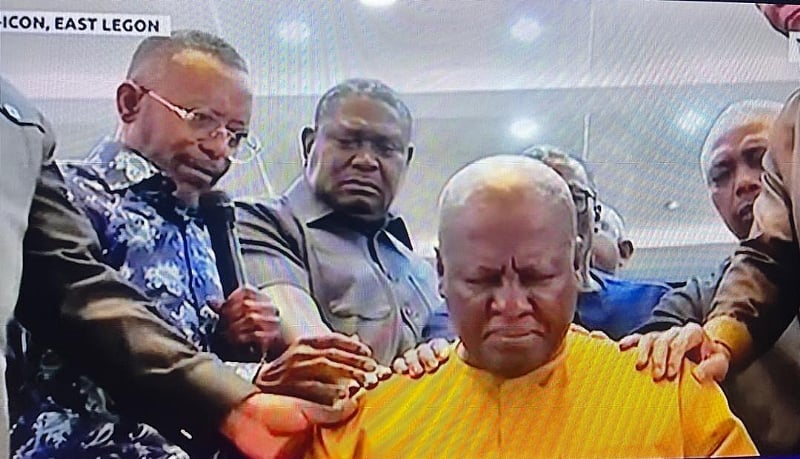Apostle Dr. Isaac Owusu-Bempah, the Head Pastor of Glorious Word Power Ministries International, has recently prophesied that John Dramani Mahama, the National Democratic Congress (NDC) flagbearer, will emerge victorious in the upcoming 2024 presidential election in Ghana. During a meeting with influential clergy members on October 1, he conveyed that Mahama’s kind-heartedness has played a pivotal role in what he claims is God’s decision to hand over the country to Mahama. Owusu-Bempah emphasized that this divine claim is unchangeable, suggesting that Mahama possesses qualities desirable for national leadership. This meeting served not just as a prophecy session but also an opportunity for prayer, where Mahama was seen kneeling, receiving blessings and support from a group of prominent religious figures.
In the context of Ghana’s political landscape, Owusu-Bempah’s prophecy may align with existing sentiments within some segments of the population. The former president has been on the campaign trail, engaging with diverse groups to bolster his chances in the December 7 election. With Owusu-Bempah’s backing, it appears that Mahama is leveraging spiritual legitimacy to enhance his credibility among voters. The engagement with clergy signifies an attempt to tap into religious sentiments prevalent among many Ghanaians, which may be pivotal for electoral success. Owusu-Bempah’s supportive remarks also cut against the backdrop of his previous alignment with the ruling New Patriotic Party (NPP), showcasing an intriguing intersection between religion and politics in Ghana.
Moreover, the climate leading up to the elections is charged with opinions from various polls that suggest Mahama could likely win the presidency. He faces strong competition, particularly from Dr. Mahamudu Bawumia, the flagbearer for the ruling NPP, suggesting that the election campaign is set against a polarized political backdrop. Bawumia’s candidacy represents the ruling party’s effort to maintain its grip on power, thus intensifying the race. Nevertheless, Mahama’s engagement with influential religious leaders can be interpreted as a strategic move aimed at consolidating support across religious demographics, which may potentially sway undecided voters.
The prophecy communicated by Apostle Owusu-Bempah could serve to galvanize Mahama’s supporters, providing them with a spiritual narrative that frames his candidacy in a prophetic context. This may instill a sense of hope in Mahama’s base, regarding not only his chances but also the intended direction for the country’s future—a narrative that Owusu-Bempah skillfully crafted by emphasizing divine favor. Such religious endorsement, particularly from a pastor known for his influence, has the potential to enhance the political discourse and mobilization efforts, urging followers to unite and vote collectively in favor of Mahama’s candidacy.
Understanding the dynamics of Ghana’s electorate is crucial, especially as Mahama builds momentum ahead of the election. The general populace appears to be shifting towards considering his leadership experience and vision for Ghana amidst various social and economic challenges. Owusu-Bempah’s favorable commentaries may serve to fortify Mahama’s standing, injecting a renewed vigor into his campaign efforts, which already appear to be gaining traction. The impending election therefore functions not only as a contest between political parties but also as a reflection of contemporary Ghanaian society wrestling with its aspirations and reality.
As the election date approaches, the focus will likely remain on both Mahama and Bawumia as they navigate the complex political terrain. Each contender will need to address the pressing issues facing Ghanaians, all while courting the necessary support from key demographic groups. The influence of religious endorsements, as seen in the recent prayer meeting, cannot be overlooked in how it shapes voter perceptions and preferences in the election landscape. Ultimately, the synergy between spiritual guidance and political strategy may be a decisive factor in the outcomes of the 2024 presidential election as Ghanaians prepare to cast their votes.


